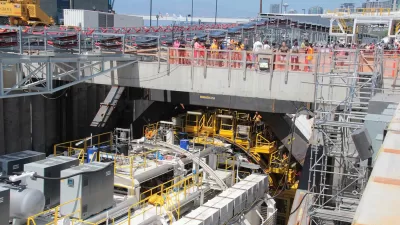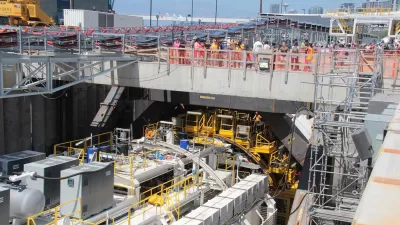"Seattle is in the midst of a full-spectrum transportation fustercluck," writes David Roberts for Grist.

"Like most megaprojects, Seattle's tunnel was sold to voters and city leaders through a rose-tinted fantasy that is already in shambles," writes David Roberts. "But no city or state leader seems willing to reverse course."
"That is typical. One of the main reasons transportation megaprojects end up being such nightmares is that leaders are terrified of abandoning sunk costs. (Has the term 'sunk costs' ever been more apropos?) They will keep throwing public money down holes even as disasters unfold. Anything is better than admitting a catastrophic mistake."
Not only was the project a mistake of engineering, according to Roberts, it's also an example of bad planning. "Seattle does not need an urban highway, any more than San Francisco, Milwaukee, Portland, Vancouver, Madrid, or Seoul needed theirs. They tore theirs down and the traffic jams did not materialize. Instead their urban cores became more walkable and pleasant, so they attracted more people, more businesses, and more tax revenue. Cities work best when designed for the people who live in them, not the people trying to get through them as quickly as possible."
FULL STORY: Seattle’s unbelievable transportation megaproject fustercluck

Planetizen Federal Action Tracker
A weekly monitor of how Trump’s orders and actions are impacting planners and planning in America.

Maui's Vacation Rental Debate Turns Ugly
Verbal attacks, misinformation campaigns and fistfights plague a high-stakes debate to convert thousands of vacation rentals into long-term housing.

Restaurant Patios Were a Pandemic Win — Why Were They so Hard to Keep?
Social distancing requirements and changes in travel patterns prompted cities to pilot new uses for street and sidewalk space. Then it got complicated.

In California Battle of Housing vs. Environment, Housing Just Won
A new state law significantly limits the power of CEQA, an environmental review law that served as a powerful tool for blocking new development.

Boulder Eliminates Parking Minimums Citywide
Officials estimate the cost of building a single underground parking space at up to $100,000.

Orange County, Florida Adopts Largest US “Sprawl Repair” Code
The ‘Orange Code’ seeks to rectify decades of sprawl-inducing, car-oriented development.
Urban Design for Planners 1: Software Tools
This six-course series explores essential urban design concepts using open source software and equips planners with the tools they need to participate fully in the urban design process.
Planning for Universal Design
Learn the tools for implementing Universal Design in planning regulations.
Heyer Gruel & Associates PA
JM Goldson LLC
Custer County Colorado
City of Camden Redevelopment Agency
City of Astoria
Transportation Research & Education Center (TREC) at Portland State University
Jefferson Parish Government
Camden Redevelopment Agency
City of Claremont



























